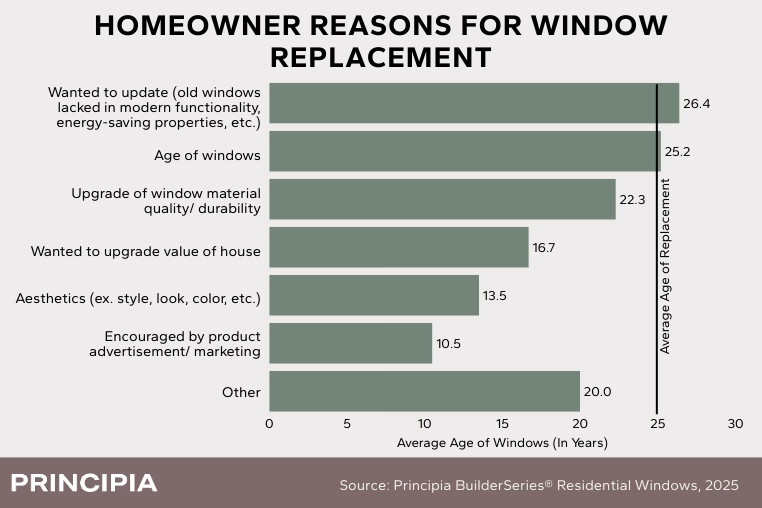Why Homeowners Replace Their Windows Earlier (and What It Means for Your Business)
Windows are a crucial element of any home, impacting both its appearance and functionality. But why are some homeowners replacing their windows much sooner than the average age of replacement? A recent survey of almost 700 homeowners by Principia sheds light on this notable trend, and the findings are essential for window manufacturers, building materials dealers, and homeowners alike.

Early Window Replacement Driven by Homeowner Discretion
When we think of window replacements, we often assume they happen only when they’re completely necessary. Perhaps the windows are cracked, sashes no longer functional, or poorly insulated, causing drafts and skyrocketing energy bills. However, our recent homeowner survey revealed an interesting insight: about half of the homeowners surveyed replaced their windows for discretionary reasons rather than non-discretionary necessity.
What Are “Discretionary Reasons” for Replacement?
Discretionary reasons include any upgrades that homeowners choose without immediate external need, like damage or structural failure. Here’s what the data uncovered about discretionary replacements:
Modernization and Upgrades
The majority of homeowners who replaced windows for discretionary reasons reported doing so to update old windows that lacked modern functionality, energy-saving features, or aesthetic appeal. For example:
- Replacing single-pane windows with double- or triple-pane options for better insulation
- Opting for vinyl or composite frames to improve durability and reduce maintenance
- Switching out outdated styles for sleeker, contemporary designs
Homeowners were willing to replace windows that were still functional but couldn’t keep up with the growing demand for energy efficiency and modern finishes.
Aesthetic Appeal
A smaller group of respondents replaced their windows mainly for aesthetic reasons. Interestingly, this group replaced their windows an average of 13 years earlier than those upgrading for other discretionary reasons like durability improvements or energy savings. This indicates that aesthetics, while a less common motivator, can drive replacements earlier than other factors.
Increasing Property Value
Another critical driver was the desire to enhance home resale value. Many homeowners see windows as an investment in their property’s curb appeal and marketability. High-quality, modern windows not only function better but also offer a significant return on investment when selling a home.
The Average Age of Replaced Windows
One additional takeaway is the average age of windows being replaced. Among all homeowners who replaced their windows, the average windows were 25 years old. It’s worth noting that replacing aging windows can align with energy-efficiency goals, especially given the importance of sustainability and reducing utility bills for homeowners. However, since 2021 the average age upon replacement has increased from 22 years as homeowners put off replacement amid economic uncertainty.